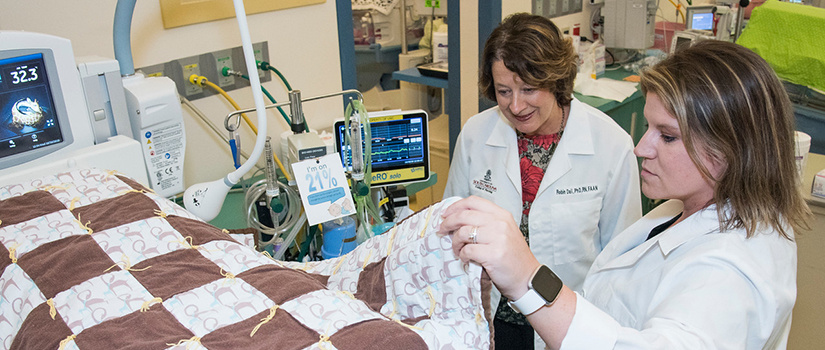Student assists in $2.7M NIH funded study
While as a bedside nurse in the Neonatal Intensive Care Unit, Kayla Everhart had the long-term goal of working in higher education as a nursing educator for BSN students. Now, in the PhD program at South Carolina she is one step closer to achieving her dream.
“I want to help mold younger nurses into leaders and be a mentor to them.”
Everhart’s nurturing instinct to help others is the catalyst for her PhD research involving neonatal premature newborns.
Over the past two years, Everhart has been working with her PhD mentor, Dr. Robin Dail, on Dail’s five year $2.7M National Institutes of Health funded study as a research coordinator. The study includes five NICU sites, enrolling 440 infants, to examine body temperature and heart rate over the first 30 days of life as a predictor of infection. Everhart’s role as the research coordinator includes data management, site visits and troubleshooting technology within the sites.
“I like seeing the positive impact the research is making and using the research to help babies- who can’t help themselves,"
She is focusing her PhD dissertation on performing a secondary analysis of Dr. Dail’s PATH study where she will look at body temperature in 30 premature infants over their first two weeks of life. Everhart is interested in the relationship between body temperature, infant feedings and blood transfusions to the incidence of necrotizing enterocolitis, a devastating gastrointestinal infectious disease that occurs in 5-10% of these infants. She will complete a literature review around the subject and perform a secondary analysis of all the blood transfusions that occurred with the 30 infants in that study.
Everhart communicated that her involvement in this research is preparing her for professional advancement after graduation stating , “the experience I’m gaining with Dr. Dail and my dissertation is providing me with the opportunities to enhance my skill set and I feel I will have a strong advantage in research and education after I graduate.”
